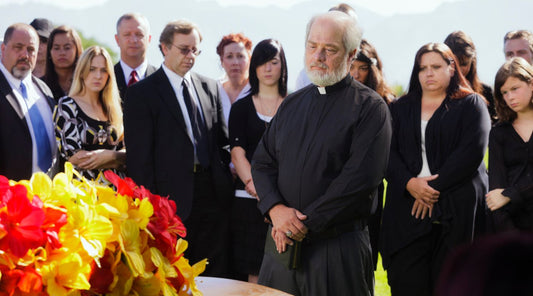
Never Say These 5 Things at a Funeral: Plus What to Say Instead That Will Actually Help
We've all been there – standing awkwardly at a funeral, our minds racing to find the right words to say. What to say at a funeral isn't exactly dinner table conversation, but it's something we all face eventually.
Here's the thing: your words matter more than you think. Research shows that what people say during grief can impact healing for months or even years to come. And while you might think those standard comfort phrases are helpful, neuroscience suggests that certain well-meaning comments can actually trigger stress responses in grieving brains.
Recent studies of cultural funeral customs show we're getting it wrong more often than right. But don't worry – knowing what not to say is half the battle. Modern grief experts now focus less on scripted condolences and more on authentic connection. And that's exactly what we'll cover here – the real deal on what to avoid and what actually helps when words feel impossible.

Why Words Matter at Funerals
Let's talk brain science for a second. When someone's grieving, their brain actually processes words differently. Neuroscience shows that the grieving brain is extra sensitive to both comfort and hurt. That's why knowing what to say at a funeral isn't just about being polite – it's about supporting someone's healing journey.
Recent research from grief counselors reveals that the words we hear during intense grief get stored in a special way. They stick around in our emotional memory, sometimes for decades. It's wild, but people often remember exactly what others said at funerals, word for word, years later.
Here's something most people don't know: your brain treats social support during grief like a physical painkiller. The right words at a funeral can literally help ease someone's pain. But the wrong ones? They can trigger stress responses that make grief even harder to handle. That's why those old-school "at least" phrases are out, and genuine, thoughtful support is in.

5 Things to Never Say at a Funeral
1. "I know exactly how you feel"
Look, everyone's grief is their own weird journey. When you say this, you're actually shutting down their unique experience. Grief counselors warn that comparing losses can make people feel like their pain isn't valid. Instead, try: "I can't imagine what you're going through, but I'm here." This opens the door for them to share if they want to, without making assumptions about their feelings.
2. "They're in a better place"
Even if you mean well, this one's tricky. Recent studies show that spiritual platitudes can actually increase anxiety in grieving people, especially if they're not religious. Plus, let's be real – no place feels better than having their loved one here. A better approach? Simply say, "I'm so sorry for your loss" or share a specific memory about their loved one.
3. "Everything happens for a reason"
Here's the deal – when someone's heart is shattered, they don't need a philosophy lesson. Grief experts say this phrase can make people feel worse because it suggests their loss serves some greater purpose. What to say at a funeral instead? Try: "This really sucks, and I'm here for you." Sometimes raw honesty beats forced positivity.
4. "At least they lived a long life" / "At least they didn't suffer"
Any sentence starting with "at least" needs to go in the trash. Research shows these comparison statements can actually prolong grief because they minimize the loss. Whether someone lived to 20 or 90, their death still hurts. Skip the silver lining and try: "They meant so much to so many people".
5. "Let me know if you need anything"
This sounds helpful but puts the burden on the grieving person to reach out – something most won't do. Mental health professionals note that grieving people rarely have the energy to ask for help. Instead, be specific: "I'm dropping off dinner on Tuesday" or "I can pick up the kids from school this week." Concrete offers are way more helpful than vague ones.
What to Say Instead: Helpful Alternatives
Share Real Memories
Skip the generic stuff. What to say at a funeral? Share that funny story or small moment you remember. Recent studies show that specific memories help grieving people maintain healthy connections with their loved ones. Keep it short and sweet: "I'll never forget how your dad always had those terrible dad jokes at every BBQ" or "Your mom's chocolate chip cookies made every study session better".
Make It Concrete
Instead of vague offers, get specific. Grief experts say the best support is practical and immediate. Try:
- "I'm bringing dinner Thursday - lasagna okay?"
- "I can walk your dog every morning next week"
- "I'll handle the school pickup on Mondays and Wednesdays" These clear offers are more likely to be accepted and actually help.
Just Be Present
Sometimes the best thing to say is barely anything at all. New research shows that simple presence often matters more than words. Try:
- "I'm right here with you"
- A gentle hand squeeze
- "We can just sit together" Physical presence speaks volumes when words fall short.
Follow Up Later
Here's something most people miss: grief doesn't end after the funeral. Set a reminder to check in after a few weeks. Recent studies show that support often drops off right when people need it most. Text something like:
- "Still thinking of you"
- "Want to grab coffee and talk?"
- "Remember that time when..." (share another memory)
Remember: authenticity beats perfection every time. The most meaningful thing you can do is show up and stay present, even when it's uncomfortable.
Practical Guidelines
Let's break down the real-world basics of what to say at a funeral, because every situation is different.
First up: read the room. New research shows that grief expressions vary wildly across cultures. Some families are all about sharing stories and laughing, while others prefer quiet reflection. Watch the family's lead and match their energy.
Timing matters too. Grief experts say the best conversations often happen in quiet moments, not when someone's surrounded by twenty other people. If the timing feels off, it's okay to just give a gentle hug or nod.
Here's a pro tip: different cultures have different comfort zones with physical touch and emotional expression. When in doubt, err on the side of being more reserved. You can always offer more support later, but you can't take back words that came on too strong.
Most importantly? Be genuine. Recent studies show that authenticity matters more than getting the words perfectly right. If you're unsure, simple presence beats forced conversation every time.
Conclusion
Look, what to say at a funeral isn't rocket science – it's about being real and showing up. And just like we at Trusted Caskets focus on making difficult moments a bit easier, your words can do the same. Keep it genuine, keep it simple, and remember – sometimes just being there is enough.


